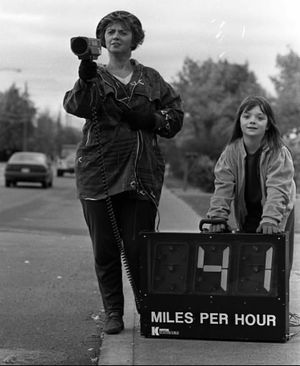Speed cameras in school zones? Spokane candidates weigh in
The city is in the midst of a pilot program testing the use of traffic cameras to catch speeders in school zones. We asked candidates in this year's Spokane city races if they supported the cameras. Here are their responses:
Ben Stuckart, incumbent candidate for Spokane City Council president: Yes, they are being tested now. In regular intersections cameras have decreased the number of crashes and we can test whether the same thing will happen in school zones. The revenue is spent on traffic calming measures in the neighborhoods so projects stay in Spokane.
John Ahern, candidate for council president: Did not provide an answer.
Mike Fagan, incumbent candidate in Spokane City Council District 1: Not before the city exhausted all other means of public education, and enforcement to change driver behavior, including the lobbying of the state legislature to change drivers education from its current teachings back to defensive driving style of teaching and certification. The jump into the speed camera program is not about safety it is about revenue.
Randy Ramos, candidate in district 1: As a single father of four children, it is very important to me to make sure that children are safe at school. Simply put, placing speed cameras in school zones can save lives.
LaVerne Biel, candidate in district 2: School zones are a public safety issue and not a revenue issue. I do not believe speed cameras will produce long term safety citizen awareness.
Lori Kinnear, candidate in district 2: Yes. Drivers who ignore school speed zones put our children at risk for injury or death. Speed cameras are a cost-effective way to identify those drivers and slow traffic in school zones.
Karen Stratton, incumbent candidate in district 3: Yes. I have supported efforts to install speed cameras in school zones. Currently, these cameras have been installed at Finch Elementary and Longfellow Elementary, areas with well-documented and high incidents of speeding in school zones. I expect they will be an important tool for making school zones safer.
Evan Verduin, candidate in district 3: Speed cameras have become the “go-to” for issues concerning traffic control and generating extra revenue. I believe they should be an option of last resort. In school zones I would advocate for less expensive solutions such as radars or speed trailers manufactured in the region before sending portions of the levied fines (to the tune of hundreds of thousands of local dollars) to out of state companies and padding the pockets of their executives.
---
Unlike the City Council candidates, who answered the question by email, mayoral candidates were interviewed in person. Here are their answers.
David Condon, incumbent mayoral candidate:
Spokesman: What do you think of the use of speed cameras in school zones?
Condon: The policy set on those is a City Council issue. I guess the critical issue that I have with it is the effectiveness of it. You have to be very disciplined to look at the effectiveness. What do I mean? We track police citations, and the interaction with officers and the public. We ultimately want safe school zones. Do you get with the camera, after the fact of giving somebody a ticket? Or do you get it with the presence of officers? So I think we should, in a controlled way, look at it very closely. I think the other worry I have is the funding mechanism for our officers. If we do utilize the cameras as a tool, and I can agree to that, we need to realize the revenue that’s generated should go back to the Police Division. It currently does not.
It goes toward traffic calming.
Yes. I think there needs to be a better balance to that. You talk about traffic safety schools. You talk about neighborhood conditions officers. There was an attempt to do that. I believe at the time it was championed by Steve Salvatori. There is a real impact. As we see those revenues that used to come to the police division now are redirected. We put the cameras in based on good data. Should we not allocate some of the funds to those very intersections that the cameras are on to presumably make that intersection safer? Right now that is not a requirement of the statue.
We need to be very disciplined in how we use that revenue. The purpose of them is for a safer community. Not as a revenue generator. We need to have the discussion of what would enhance the safety.
Shar Lichty, mayoral candidate:
Spokesman: Should speed cameras be in school zones?
Lichty: I’m not a big fan of the red light cameras. The timing of them is not accurate. They need to be working properly. There’s too much of a delay. It’s happened to me. They’re catching some people at the wrong time. They need to be synced properly and work properly. Of course, with the red light cameras, there’s the issue of somebody out of the state issuing the citations. But I think that’s been corrected.
I would rather look at other ways to slow traffic in front of schools, which is important. We need to keep our kids safe. When they put up signs, with flashing lights that show a driver’s speed, those seem to have really good success rates at slowing people down. People see they’re speeding. They see the signs. I think they assume there’s a police officer around who is monitoring traffic. It tends to slow people down. Can we achieve the same results at a lesser cost by putting those signs in front of the schools?
Be sure to read our complete coverage of the 2015 elections before filling out your ballot.

